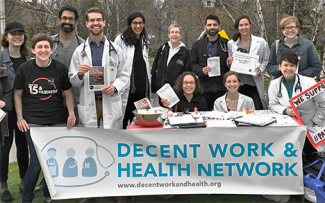ILL EFFECTS
BC unions push for paid sick days to end unfair treatment of sick workers

Team members of Decent Work and Health Network in Toronto
KATELYN HAGEL GOT FIRED FOR WANTING TO WORK. She couldn’t afford not to—even though she had ongoing health problems.
The dentist she worked for didn’t want her at work. She wanted Katelyn to take two weeks sick leave—without pay. Katelyn refused. She couldn’t afford it. She wanted to work every day she could until she would have to take time off following a scheduled surgery. Her refusal got her fired.
What happened to Katelyn is not unusual in BC. The BC Federation of Labour (BCFL) thinks it should be. The federation says too many workers in BC find themselves in real jeopardy when they get sick. The fed says the remedy is simple: make paid sick days the law in the province.
The fed launched a new “Level the playing field” campaign in July to press the government to make paid sick leave mandatory. Around 2,000 people have already signed a petition to support such a law.
A BCFL survey last year found that 40 percent of workers don’t have any sick leave. Many of these workers are in low wage, precarious jobs and are exposed to mistreatment by their employers if they fail to show up for work.
Broader campaign
BC is the province with the highest percentage of workers in precarious employment. The Level the Playing Field campaign points out: “With insecure employment, little to no enforcement and a flawed complaints process, workers lack recourse for exploitation on the job. This too often means a job isn’t a path out of poverty.”
The BCFL says its push for paid sick leave for all workers tops the list of several priorities it will press for during the ongoing NDP government review of the BC Employment Standards Act (ESA).
The fed’s list of priorities includes:
- more investment to allow “proactive investigations” into abuses of the ESA and enforcement of its provisions
- higher penalties for employers who break the law
- stricter regulations to ensure that bosses can’t avoid classifying a worker as an employee so as to shirk their responsibilities
- raising the minimum age of employment from 12 to 16
- abolishing all restrictions to the minimum wage
- eliminating the self-help kit for workers whose rights have been violated.
Going Ontario one better
The campaign in BC is looking to improve on the Ontario example, where legislation introduced earlier this year gave two days of paid sick leave to most workers—the only province in Canada to do so. The change was part of a broader reform package of the province’s Employment Standards Act.
BCFL president Irene Lanzinger believes two paid sick days annually aren’t sufficient, arguing instead for between five and eight. But she added that the Ontario model would be a start. “If that’s the way the government wants to go, we would be happy to talk to them about that,” she said.
Making sure workers’ rights like paid sick days are on the books is only a first step. Dr. Andrew Pinto from the Decent Work and Health Network in Ontario explained to CBC shortly after the law changed in Ontario that his organization was planning an information campaign, including posters in doctors’ offices, to let workers know about their rights.
“I’m most concerned about vulnerable workers who maybe don’t speak English,” added Pinto. “What we’re starting with is educating healthcare workers about how to talk to patients about their rights.”
Find out more about the Level the Playing Field by visiting http://bcfed.ca/campaigns
- 30 -












Add new comment